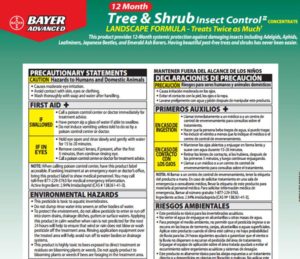Hello Fellow Readers,
I received an email from AmericanHort that “Urgent Action is Needed”. “The Environmental Protection Agency (EPA) is evaluating whether to further restrict uses of synthetic pyrethroid insecticides.” Anything urgent and pertaining to the protection of our environment always peeks a concern so I decided to dig deeper.
AmericanHort is a consolidation of the former American Nursery & Landscape Association (ANLA) and the Association of Horticultural Professionals (OFA). Their guiding principles include “to be influential advocates to impact legislative and regulatory decisions for the benefit of the horticulture industry and our consumers” and to be “passionate promoters of healthy communities”.
While pyrethrins are found in some chrysanthemum flowers, the chemicals have been modified to produce longer lasting man-made chemicals called pyrethroids. There are over 2,000 registered pesticide products that use pyrethroids to kill insects in the home, garden, and agriculture and some are used on pets and livestock. You won’t see the word pyrethroid on the labels which is confusing (or intentional?) but the pyrethroid ingredients listed often end in “thrin”.
AmericanHort together with the Pyrethroid Working Group (PWG*) asked folks in the horticultural industry to voice concerns to help the EPA better understand “the critical role pyrethroids play in the success of our industry and your business.” It’s true they have had a huge impact on crop yields. It should be noted though the PWG is an alliance of companies that manufacture chemicals including pyrethroid insecticides. Obviously, they have much at stake if the EPA initiates restrictions.
Wikipedia references a 2010 study done by University of California Berkeley researchers Weston and Lydy that found “Pyrethroids are toxic to beneficial insects such as bees and dragonflies, and to fish and other aquatic organisms.” I shared my concern and received a quick response from Jill Calabro, Science & Research Programs Director of AmericanHort, who assured that they value pollinators and shared that “when pyrethroids are used as mandated by the label (it is the law!) risk to bee pollinators is minimized. These products are not to be used when plants are blooming or about to bloom. Plus, they do not absorb into the plant; therefore, their residual is much shorter than other insecticides.” Jill attached a paper published by InTech in January 2012 called: Pyrethroid Insecticides: Use, Environmental Fate, and Ecotoxicology with pages and pages of information and research. There’s no doubt following protocols of chemical use is critical to safety. And anything not applied properly or overused such as salt or even organic chemicals can be devastating. But after reading the InTech publication and other research it seems the use of synthetic pyrethroids is risky. The dilemma is the risk versus benefit to the horticultural industry’s bottom line versus the health of our environment and our food supply. Seems to me, necessity to change is the mother of invention and it starts in our own backyards. Garden Dilemmas? Askmarystone@gmail.com
What to look for: A partial list of pyrethroid ingredients found on product labels include chemicals hyphened with Cypermethrin, Cyfluthrin and Cyhalothrin. Then there’s Bifenthrin, Bioresmethrin, Cyfluthrin, Cypermethrin, Deltamethrin, Esfenvalerate, Fenpropathrin, Fenvalerate, Permethrin, Resmethrin, Tefluthrin, and Zeta-Cypermethrin.
 Some of the over-the-counter brands of pyrethroids include: Ortho Home Defense MAX, Bug-B-Gone, Triazide, Hot Shot Fogger6, Scotts Lawn Pro Step 3 Insect Control Plus Fertilizer, Tempo, and several Advanced Garden products such as to name just a few. There are over 2,000 licensed products that have pyrethroids and many can only be used by those licensed to apply chemicals.
Some of the over-the-counter brands of pyrethroids include: Ortho Home Defense MAX, Bug-B-Gone, Triazide, Hot Shot Fogger6, Scotts Lawn Pro Step 3 Insect Control Plus Fertilizer, Tempo, and several Advanced Garden products such as to name just a few. There are over 2,000 licensed products that have pyrethroids and many can only be used by those licensed to apply chemicals.
*The PWG is an alliance of companies such as BASF, Bayer, AMVAC, FMC Corporation, Syngenta and Valent that manufacture chemicals including pyrethroid insecticides.




